 This past week we celebrated the Feast of the Nativity of St. John the Baptist, who is sometimes referred to as the Forerunner. John was one of the greatest and also the last of the prophets who came before Jesus. His entire life was oriented toward preparing others for the Messiah. Everything he did and every word which came from his mouth was for the purpose of showing others the way to Jesus. And once Jesus came John stepped aside so that Jesus would be the one to whom others looked. Therefore, to celebrate the birth of John the Baptist is to recall who he was and the importance of his role: he had the boldness required of a prophet who was tasked with being the bearer of a world-changing message, yet he was filled with the humility of knowing that he was not the source of message, but was simply the messenger. The feast of his birth reminds us that like St. John the Forerunner, we are also called to point others to Jesus through the gifts given to us at baptism. A forerunner is described in the dictionary as “a person who goes or is sent in advance to announce the coming of someone or something that follows.” St. John was born into such a role. At the time of his conception his father was told by the angel Gabriel, “He will be filled with the Holy Spirit even from his mother’s womb, and he will turn many of the children of Israel to the Lord their God. He will go before Him in the spirit and power of Elijah to turn the hearts of fathers toward children and the disobedient to the understanding of the righteous, to prepare a people fit for the Lord.” (Luke 1:15-17) John was sent ahead of Jesus, therefore, to help people to be cleansed of sin so their hearts would be ready to accept the Lord. When Jesus came to him at the Jordan River asking for baptism, John recognized Him as the Messiah and Son of God. Humbled by Jesus’ request, saying it was Jesus who should be baptizing him, John obeyed and baptized Jesus. (Matthew 3:13-17) John was always obedient to the Word of God, yet as soon as he acquiesced, he made it clear that he must decrease while Jesus increased. (Paraphrase of John 3:30) In other words, he knew his role was fulfilled and that the time of the Messiah had come. 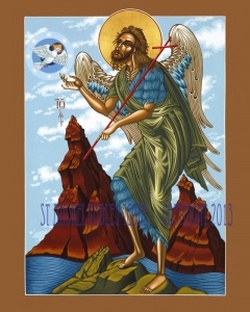 St. John was imbued with the message of the prophets who came before him. While we may see him as a gaunt, undernourished figure dressed in tattered animal skins, unkempt, and a bit wild-eyed, he was not an unbalanced or arrogant man, more certain of himself than of God. Rather, he was clear that the message he shared was God’s and so he could be bold with the truth. John was fully alive, so filled with the message and Spirit of God that he was afire with burning zeal to share that love with the children of Israel, knowing he would be misunderstood by taking a hard stand against the religious and political authorities of the day in preaching the truth. He stood up to King Herod when Herod was living with someone not his wife, and paid with his life for being willing to continue to preach truth in the face of derision and opposition. This week we also celebrate the Solemnity of Saints Peter and Paul. These two men are the ones who truly gave the Christian church its rich spiritual foundation, spreading the Good News as they had been taught by Jesus Himself. Both were witnesses to Jesus, Peter ministering to those in Jerusalem and then in Rome, and Paul as a missionary spreading the faith in Asia Minor particularly to the Gentiles. These two men were also forerunners. They came after Christ, of course, but they prepared others for the reception of the Holy Spirit into their lives. In their preaching and in conferring the sacraments, they were pointing men and women to Jesus. They helped people to have an understanding and acceptance of Jesus as the Son of God so that they might have salvation. In doing so, they were forerunners of the Good News, announcing the message so that it would take up residence not only within their followers, but that it would be handed down to all of us who were to come afterward, so we too would know God’s love and mercy. Then, like John, they stepped out of the way. 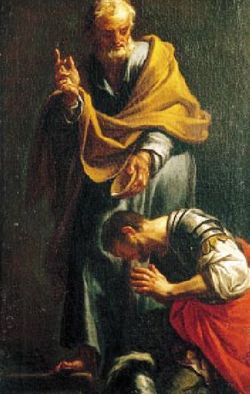 Saints Peter and Paul were willing to do the same thing as John the Forerunner. They also stood against the Jewish leadership, the Romans, and all those who were antagonistic toward the followers of Jesus. They were willing to suffer much for the Good News, (that is, for Jesus) because they believed in the truth of the message and that Jesus is the Son of God. They were well aware that anyone who taught or embraced the truth of Jesus might be martyred. And yet they continued to heal the sick in Jesus’ name, to offer baptism, and to bring the freedom that comes with the truth. They understood what Jesus meant when He said: “If you remain in my word, you will truly be my disciples, and you will know the truth, and the truth will set you free.” (John 8:31-32) In other words, the truth had set them free from fear of their enemies and even from fear of death. They had been set free by Jesus’ love and forgiveness, and also in knowing that through His death and resurrection Jesus had fulfilled the promise of the Father. Their hearts were bursting with love, mercy, and compassion such that they could not contain it. Like John, they were afire with the zeal and love of the Lord. And they, too, were humble, letting the message be more important than they were. 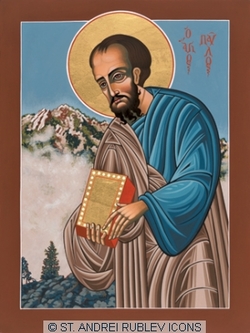 We are also called to be forerunners. Peter, Paul, and John the Baptist have gone before us, but their teaching and example remain. Thankfully there are still men and women today who have chosen to continue the work of handing down the message through ordained ministry or consecrated life, dedicating their lives to service of the Lord in a specific way. But it is not just a ‘chosen few’ who are called to do this. Through baptism all of us are called to share the Good News through service and love. If we are Christian, we need to realize we are all forerunners of a sort, bringing the message of Jesus into the lives of all we meet simply by living what we profess to believe. Being a forerunner means that first we must try to follow Jesus the best we can. John the Baptist, Peter, and Paul were not perfect, and no forerunner, (no person), is. A forerunner has to learn to let Christ do the leading, so that like John we can let Jesus increase while we decrease. In other words, we bring Jesus to people through word and deed, and then let God do the rest. We do not have to have any special talent, really, except to try to do even the smallest of things with love. A forerunner needs to be able to ask and receive forgiveness and then to give it to others in turn; to have the courage to stand up for goodness and truth by how they live; to refuse to give in to evil by instead living with love, compassion, and mercy, and to recognize that in their weakness is God’s strength. If this sounds daunting, it was no less so for Saints John the Forerunner, Peter, or Paul. Like them, we are never alone. We rely upon the Holy Spirit to give us what we need to be people of love and truth. 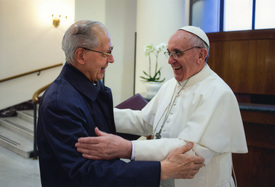 The world needs brave forerunners now more than ever. While a few, but not all, are called to be leaders in an obvious way, we can also be leaders in a quiet, humble way while still setting an example for others. Simply put, to be a forerunner is to live as a Christian. All we have to do is have a heart opened to God, a heart which is set afire with His love. If we reflect upon even one of the mysteries of His coming among us or of His death and resurrection; if we spend even a little time recognizing the love He has offered us throughout our lives, we can be set ablaze with gratitude and the desire to share this gift with others. Then, filled with mercy and compassion, we can share His love which is overwhelming in its depth and constancy. Let us therefore, be forerunners in the spirit of Saints John the Baptist, Peter, and Paul so that the Gospel continues to be a beacon of light and hope in the midst of a changing and challenging world. May we accept with confidence the Good News given to us by the forerunners who brought it to us! May we have the courage to live the message of Jesus even when it is unpopular in our society! May we trust in the message of Jesus and in His love, mercy, and redemption! May we rely upon God always, so that in our weakness we may have His strength! May we have the wisdom to know when to decrease so that the Lord can increase! And may those around us know Jesus because of our love! Let us continue to meet in the Heart of Jesus! Peace! ©Michele L. Catanese The first image is a painting of St. John the Baptist by Leonardo da Vinci. Second is an icon by Fr. William Hart McNichols called St. John The Forerunner Also The Baptist. It can be found at http://fineartamerica.com/featured/st-john-the-forerunner-also-the-baptist-william-hart-mcnichols.html Third is a painting called St. Peter Baptizing the Centurion Cornelius by Francesco Trevisani, (1709). Fourth is another icon by Fr. William Hart McNichols called St. Paul the Apostle. It can be found at http://www.fatherbill.org/all-categories/product/143-st-paul-the-apostle Last is a photo of Pope Francis and Father Adolfo Nicholás, Father General of the Society of Jesus, (Jesuits). Both men follow in the footsteps of a forerunner, St. Ignatius of Loyola, and both of these men are forerunners in their own right. 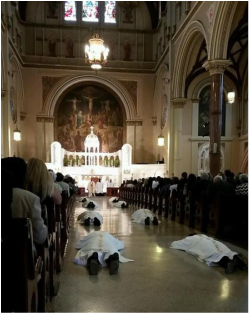 This past weekend I was able to be at the ordination to the priesthood of eight Jesuits, four of whom I know fairly well. The weekend before that I was at the Mass of Thanksgiving of a former student who had been ordained to the diocesan priesthood a day earlier. In both of these experiences there was a joy so great that it was palpable. Many of the men could hardly hold back a huge smile because ordination and saying a first Mass were the culmination of many years of prayer and preparation and also the beginning of a new way of being for the rest of their lives. For those of us celebrating and praying with them, the joy was truly catching. I found myself moved to tears, not just because the Masses were beautiful, (which they were), but because it was so obvious that this occasion was filled with the love of God. Seeing all these new priests so on fire with their love of God and their desire to serve Him was truly a witness to great love. My own tears were at being overwhelmed at the greatness of God’s love that He would give us such a great gift of Himself, present to us through these men. The love of God is indeed very overwhelming. If we were to truly feel all of the grace we are given and all of the love He bears for us we would not be able to withstand it. In Old Testament times it was believed that if one saw the face of God one would perish. God seemed to confirm this belief when He ‘protected’ Moses in response to his request to see God’s glory. God said, “I will make all my goodness pass before you, and I will proclaim my name, “LORD,” before you; I who show favor to whom I will, I who grant mercy to whom I will. But you cannot see my face, for no one can see me and live.” (Ex 33:19-20) The issue was not in seeing God’s face, but rather it was about being in the fullness of God’s love which Moses would not have been able to endure. The truth is that God’s love is so overwhelming and so intense that Moses would have indeed been consumed by it as if by the flame in the burning bush. God’s love is too intense for us to bear in our limited humanity and therefore He often moves beyond our ability to sense it. Only when we are with Him in Heaven forever will we be able to bear all that love. It is to this reality that we have to look forward. 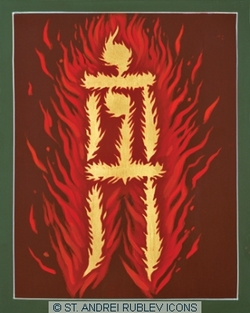 God certainly does not want to overwhelm any of us to the point of annihilation. That would not make any sense. Therefore, God gives us many great gifts in order to share His love with us in ways that we can handle without being overcome. For example He gives us people who are in our lives now and those whose love has nurtured us along the way. All of our beloved friends and family are conduits of God’s love, though maybe in an imperfect way. He also gives us the great gift of His presence through the Eucharist. We cannot fathom the depths involved in the miracle of the Body and Blood of Jesus being given to us. If we were to grasp even a little bit of the miracle of what goes on when the bread and wine are consecrated and become the Lord Jesus, if we were to comprehend even an iota of His presence in the tabernacle when we pray before Him, we would be far too overwhelmed to handle it because of all the love that He bears. I think that He veils our eyes in the midst of our daily prayer, such that sometimes it may even feel a bit empty, because His love is so great, and in contrast we are so weak and limited, that He knows we can only take a bit at a time. He gives us the gifts of faith and hope in order to trust that He is present to us so that we do not give up altogether. There have been a few saints who experienced ecstasy in their prayer; they were able to get a greater glimpse of the love of God even if just for a moment. But they could not sustain it, and often just the memory of such an experience was enough for their entire life time. Nothing could ever match it, and therefore it heightened their longing for Heaven so as to be immersed in it once again. 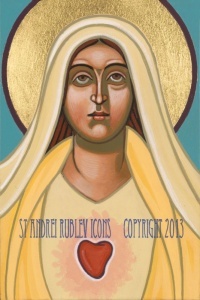 Last week we celebrated both the Sacred Heart of Jesus and the Immaculate Heart of Mary. To celebrate their hearts is to celebrate the great effusion of love each one brought into the world. That Mary was immaculate and full of grace is the only way she could have continually born the love of God when she was overshadowed by the Holy Spirit and carried Jesus for nine months. After Jesus’ birth she chose to share the love she was given rather than to hold onto it solely for herself. Mary learned of the fullness of love from Him, not only as His mother, but also as a disciple. She trusted in the promise of God that Jesus was the Messiah, the Son of God, who would conquer sin and death, and she chose to be enfolded in love rather than to be overwhelmed by pain. Therefore she knew the joy of being loved and of being able to return that love, such that she is one to whom we can always turn to intercede for us when we are in need. In daily life it is important to open our eyes to love even in the midst of misfortune. Both joy and suffering can teach us great lessons. They teach us to value life and the things in it differently. They show us what really matters; and always what matters most are the people in our lives who are beloved to us, not the material possessions we have acquired. While material things are nice, they have no lasting value when life and death are weighed against them. We take none of it with us when we die. But what we do take is the love of those who we encountered and the love of God which never leaves us. We take with us the effects of the love which we gave in response. Even if we were not born into a loving family, it was the love of God which has accompanied us into life and which is with us the entire time we are here; it is His love which will usher us into the next life, and in whose company we will live forever. This is the pearl of great price of which Jesus taught. It is not material, but it is the love which we have always had and which we nurture by sharing with others. Paradoxically if we try to horde love, it shrinks, and if we give love away, it grows. 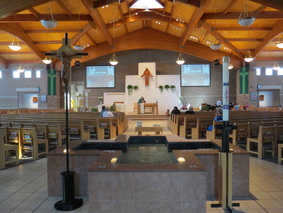 The more we open our hearts to people in whatever circumstances they may be, (or in which we find ourselves), the more we experience the intensity of the love of God. The more we learn to see love in people, the more we can learn to recognize love in the beauty around us and in every good gift we have received, including the gift of those who dedicate their lives to service, such as the men ordained during the past few weeks. We can experience God’s presence through the sacraments which priests and deacons are empowered to preside over with us. God called them to be ministers of His love for our sake, and they responded to Him in love, ensuring us visible signs of His presence through their service. While we cannot feel love constantly due to our limitations, we can trust in its power and in the promises of God. The more we trust in God and His gifts, the more we will be able to recognize love as He offers it, and even with intensity, in a tiny piece of bread and a sip of wine made Body and Blood. Let us therefore welcome the love residing within our hearts, allowing ourselves to be overwhelmed by God’s greatest gift. May we trust in God, believing in His promises, His presence, and His saving love for us! May we allow ourselves to be overwhelmed by the immensity of God’s love in the here and now! May we continue to pray for vocations to priesthood and religious life and may we have gratitude for those who respond to God’s call to ministry! May we ask for the gift of love for those with whom we come in contact, especially for those who are most difficult to love! May we see the goodness in those who are different than ourselves, receiving their love no matter how imperfect! May we forgive those who do not know love, having mercy and compassion for them! And may we sit in wonder and awe at such a loving God, amazed and filled with gratitude! Let us continue to meet in the heart of Jesus! Peace! ©Michele L. Catanese The top photo was taken by Mary Solcher at St. Joseph's Catholic Church in New Orleans during the Jesuit ordination mentioned in the first paragraph. Next are the work of Fr. William Hart McNichols. The first is called The Heart of the Mother of God and it can be found at http://www.fatherbill.org/all-categories/product/160-the-heart-of-the-mother-of-god. The second is an image called The Name of God Yahweh which can be found at http://www.fatherbill.org/all-categories/product/31-the-name-of-god-yahweh. The last photograph is one I took at St. Joseph on the Rio Grande Catholic Church in Albuquerque, New Mexico. 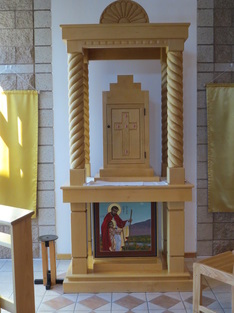 There is little doubt in my mind as to why the Feast of Corpus Christi and the Feast of the Sacred Heart of Jesus are within the same week in the liturgical calendar. It truly makes sense that when we are celebrating the incredible mystery of the Eucharist which Jesus left us, that it is His body, blood, soul, and divinity, we also remember it comes forth from a heart completely imbued with love. His heart literally ached and broke for love of us, and through that heart flows His precious blood. The Sunday feast, Corpus Christi, is about the absolute mystery of the bread and wine becoming the body and blood of Jesus; this means it is a mystery which can never be understood in this life. But the Feast of the Sacred Heart, though still a mystery, is about the depth of the love of God for His people. In other words, the first feast is about the reality of the Eucharist, the other is about the love behind the reality. The Eucharist is what fuels our experience of God’s love. Therefore, there is an intimate connection between these two feasts. When I reflected on this it reminded me that I have sometimes heard people talk about a difficult experience as a test from God. They say: “This is so difficult. I think God is testing me.” I have to admit that I do not believe God tests us. He does allow things to happen which may be difficult since that is part of living as a human in a world in which all people have free will. Even the cosmos has a type of freedom; that is, there are laws in nature, but there is also randomness in how some things occur. It is beyond us to really know the ‘why’ of many things. 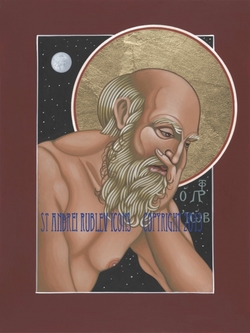 God knows our hearts and minds better than we know ourselves and therefore He knows everything about how we make choices, what our strengths and weaknesses may be, and what we tend toward. A loving God has no need to toy with us just to see how we might react. Some would argue against this assertion using the Book of Job as their ‘proof.’ In Job it says that God allowed Satan to put Job to the test, not once, but twice. However, the Book of Job was written as a short story (or even a long parable) therefore the testing is a scenario in which the author is making a point, inspired by God in his writing. He is trying to explain that suffering often comes unbidden and that it is mysterious. The inspired author set out to dispel some common misconceptions about why people suffer. In the end God (through the writer) wants us to know that we ought not to be asking “Why am I suffering?” because it is a question which is too complex for us to comprehend. Rather we should ask, “Where is God when I am suffering?” This is a question with an answer: God is with us in the midst of our suffering. Therefore the Book of Job is not about being tested. It is about God’s love which is so great that He enters into our every suffering with us, just as Jesus Christ came into the world to enter into our suffering and therefore to redeem us. Another story which is often misunderstood is the story in the book of Genesis about Abraham nearly sacrificing Isaac. While the Bible's editors have actually titled this section “the testing of Abraham," it is not really a story about Abraham, but rather it is about the nature of faith. Abraham had spent all of his very long life doing what God asked of him without even the hint of a question. When God said for him to leave his homeland and go to a place God did not even identify at the time, he went. He believed Him when he was told in his old age that he would have a child by his wife who was well past childbearing age. Abraham never wavered in his belief in any of God’s promises. So why would God have any need to test this man? God simply would not have had any reason to do so.  In the story God tells Abraham to take Isaac, his only son by his wife, to a mountain top and to sacrifice him there. God had previously made a covenant with him promising a nation would come from Isaac’s descendants. Abraham knew that God had never broken any covenantal promise. But nonetheless, he must have been in turmoil as he went up that mountain because the command did not make sense. But he did proceed. Abraham trusted God so deeply, that even in his utter confusion as to why God would ask this, he went as far as raising the blade over his son who was on the altar of sacrifice. God, of course, stopped Abraham from committing any harm to his son. But here is the point: this story was not about Abraham being tested, it was about Isaac learning the type of faith he would need to carry on the covenant. He had to see the radical faith in God which Abraham possessed and in which he would have to live as he took over the role of patriarch after Abraham’s death. In short, Isaac needed a lesson in radical faith and God provided it. This incident was to teach Isaac and the rest of us that faith is what we need when situations do not make any sense. It is when situations or circumstances that are difficult try our resolve or when the ‘enemy of our human nature’ (the evil one) tempts us, that we are tested. But God is not a tester. He would not be a loving God if He was whimsical and flighty about how He treated us, or if He tested us as if He did not know our heart. Some may argue that He tests us to strengthen us, but I do not think so. Life tests us enough and God does not have to add to it. Instead I think that when the hardships come, God walks into it with us giving us strength in our weakness. The test does not strengthen us. God does. 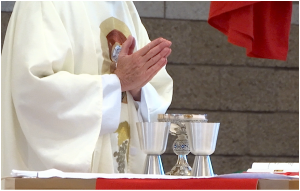 It is important to accept that God loves us much better than we know how to love Him or anyone else. His love is so deep that we cannot comprehend it. We can experience it, but we really cannot understand the mystery of how God could continue to love us when we sin or how He loves us so deeply that there is nothing we can do to lose that love. Some of us search long and hard for love that lasts, even the entirety of our lives, when all along we have the love of God which has no beginning or end. The Sacred Heart of Jesus is the heart of God and this heart is infinite with depths which cannot be plumbed. The heart of Jesus loved us so much that He came into the world, suffered, died, and rose for us. But before He did this, He left Himself here with us in the form of simple bread and wine. His love is so mysterious and complex that we cannot understand how this is. But we can see, touch, taste, and smell the bread and wine become Body and Blood. When it is consecrated it is really and truly the entire body, blood, soul and divinity of Jesus Christ. It is not a symbol nor is it a reminder. It is Jesus. Therefore, when we celebrate the Feast of Corpus Christi we are celebrating the great mystery of Jesus giving us His body and blood as an everlasting gift until the day comes when we are united with Him face to face in Heaven. We are never alone because He is with us in spirit and in flesh. And when we celebrate the Feast of the Sacred Heart of Jesus we can know that the human and divine heart of Jesus contains the very love of God. It enables us to receive the Eucharist and in turn to bring Eucharist to others through our own loving acts. The gift of access to the Heart of Jesus, the love of God poured out for us in an everlasting covenant of love through bread and wine which becomes His body and blood, is incalculable. It is not something we earn. It is simply Jesus being Jesus. The Heart of Jesus is never empty and His love never runs dry. Therefore let us live in thanksgiving for so great a gift as the love of God poured out endlessly for us. Let us find strength in His heart and in the food for the journey with which He has provided us. 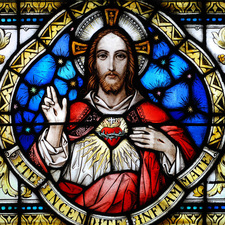 May we always appreciate the great gift of the love of God for us poured out in the Body and Blood of Jesus! May we find solace for our grief as well as joy in our blessings within the Sacred Heart of Jesus! May we continually be fed by the Body and Blood of Jesus contained in the Eucharist! May we lead others to the love of God, and may we place our care for them within the Sacred Heart of Jesus! May we find in Jesus the example of how to live lives of faith and love! And may we never lose sight that we are loved and that we are children of God forever! Let us continue to meet in the Sacred Heart of Jesus! Peace! ©Michele L. Catanese The top photo is mine and was taken at St. Joseph on the Rio Grande Catholic Church in Albuquerque, New Mexico. This is the tabernacle with the original icon San Jose en el Rio Grande beneath. The icon is the work of Fr. William Hart McNichols and copies can be obtained as plaques or cards at http://fineartamerica.com/featured/san-jose-en-el-rio-grande-william-hart-mcnichols.html The next icon, which is Holy Prophet Job, is also the work of Fr. William Hart McNichols and it can be found at http://www.fatherbill.org/all-categories/product/320-holy-prophet-job Following this are two more photos: the first I took on a hiking trail atop Sandia Peak in Albuquerque, New Mexico and the second is of the hands of Fr. Bill McNichols as he is celebrating the Eucharist. Finally is The Sacred Heart of Jesus, a stained glass work by Philip Ralley. It can be found at http://fineartamerica.com/featured/1-sacred-heart-of-jesus-in-stained-glass-philip-ralley.html |
Heart Speaks to Heart
|

 RSS Feed
RSS Feed

